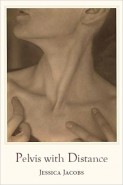
Book Review: Pelvis with Distance by Jessica Jacobs

Pelvis with Distance: A Biography in Poems / Self-Portrait by Proxy
Poems by Jessica Jacobs
ISBN-13: 978-1935210665
White Pine Press, March 2015
Reviewed by Alix Anne Shaw
“I am in the desert,” writes Jessica Jacobs in Pelvis with Distance, “which is not a place of light / on things but things / in light.” Taking up residence near Pedernal, the mountain famously painted by Georgia O’Keeffe, Jacobs engages in an extended meditation on human isolation and connection. She proceeds to trace the contours of Georgia O’Keeffe’s biography and geography, meditating on the double-edged nature self-imposed exile. “Here, // the fulcrum on which sky / rests,” she writes in “Pedernal, 1945,” “What weight loneliness / against all this?” Writing daily for a month, the poet explores links between between herself and O’Keeffe, separated by time; between O’Keeffe and Stieglitz, separated by distance; between poet and painter, separated by art forms; and finally between herself and the lost lover she still longs for.
Throughout the book, Jacobs gives voice to O’Keeffe’s reconstructed experience through lyric narratives, making deft use of both epistolary and ekphrastic modes. The sharply imagistic poems are delicate and well-wrought, as in the book’s title poem, where “Bone grows from desert / in distance / . . . . / Pelvis is loupe, is meant / for looking through.” As these lines suggest, Jacobs’s project is deeply rooted in materiality. Archival materials form the starting point for many of the poems: historical photographs, the bones O’Keeffe painted, O’Keeffe’s correspondence with Stieglitz, and, of course, her paintings. In this way, Pelvis with Distance comprises a sort of love letter to the painter—one based on delicate rendering and historical accuracy. At times, however, one wishes that the poet had done more to re-envision the now-familiar interpretations of O’Keeffe’s conflicted marriage and biography
Although the overall uniformity of these poems—in approach, in linguistic strategies, and in form—
runs the risk of becoming too predictable, it is effectively broken up by wilder, rougher excerpts from the poet’s daily experience. Interspersed with the dramatic monologues, Jacobs includes impressions of her monthlong isolation. These journalistic entries read as long-lined prose poems chronicling her attempts to “reverse-engineer a life.” It is here, in the gaps, that the book takes on its real force. In contrast to O’Keeffe, the poet realizes her own inability to live a life of isolation and moves toward writing to the lover she has lost. Ultimately, she celebrates both her similarities and differences from O’Keeffe. As she writes in “Composite [Self-] Portrait as Wise Desert Elder, “I own / and abide in two / houses and inhabit / my face as fully.”
Through the friction between the O’Keeffe’s poems and her own diary, Jacobs opens space to contemplate, asking the reader to consider the extent to which we need human companionship and why. Though at times unsurprising, Pelvis with Distance is a beautifully-written book, full of sharply-rendered images and the wisdom of lived experience. Throughout, Jacobs raises compelling questions, shedding light on both the tenuousness and the tenacity of human connections.
Alix Anne Shaw is the author of two poetry collections: Dido in Winter (Persea 2014), and Undertow (Persea 2007), winner of the Lexi Rudnitsky Poetry Prize. Her poems and reviews have appeared in Harvard Review, Black Warrior Review, Denver Quarterly, The Los Angeles Review, The Kenyon Review, and New American Writing. She also holds an MFA in Sculpture from the School of the Art Institute of Chicago. Her work can be found online at www.anneshaw.org.

Leave a Reply